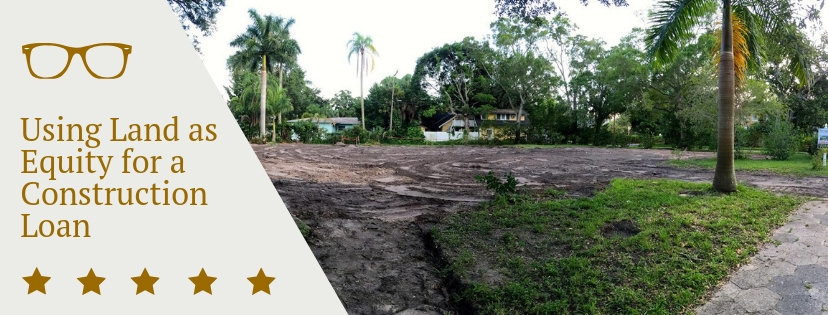The short answer to the question “Can I use my land as equity for a construction loan” is yes.
If you own your land outright (no mortgage or liens) you can likely use your equity in the land toward the purchase of a new home. In this scenario, you could use your equity in the land as collateral or obtain a new loan against property and use the funds as a down payment on building your new home.
There are other factors, of course. The value of your land, the sales price of the home you wish to build, your credit score/credit history, and loan programs you can qualify for will all be determining factors in the use of land as equity for a loan.
How to Use Land as Equity for a Construction Loan
Construction lenders normally require a down payment of 30% of the loan amount although in some cases 20% will be acceptable.
One-time close construction loans, sometimes known as “all-in-one” and “construction-to-permanent” loans, are a popular way to use land equity to build your dream home. Using your land as collateral, a construction loan for the building project is combined with a mortgage loan for your finished home. These loans have one approval process, one closing date and one set of closing costs.
You will want to shop lenders for such a loan. Some charge higher interest rates for the construction phase of the loan than for the mortgage portion, while others will lock in a fixed rate for the entire loan.
How Much Can I Borrow for a Construction Loan?
The answer varies based on several factors. You may be able to borrow up to :
- 75% of the project appraised value– Most lenders will loan up to 75% of the appraised value of the home you are building.
- 95% of the construction costs – if you are in a strong financial position (perfect credit history, regular income, genuine savings)
- 80% of the value of the land plus construction costs – if you can find the right lender (most banks won’t lend for cost plus building contracts).
- Borrow up to 100% with a guarantor loan – a guarantor loan is usually a parental guarantee (a family member using real estate that they own as additional security for your loan).
Getting Preapproval for Your Construction Loan
Much the same as when you shop for a conventional mortgage for an existing home, it is a good idea to get preapproval on your construction loan for your new custom home. This will give you the comfort in knowing that you can borrow enough to build your dream home or whether you will need to modify your vision.
Before you meet with a lender, make sure that your property is eligible to secure a construction loan (no mortgage or leins). Search your town’s registry of deeds for any old liens that may still be attached. If any are present, have your attorney take steps to correct the record.
Requirements for a Construction Loan
Lenders will look at three factors when considering your loan approval:
- Your Credit Score
- Income
- Debt-to-income ratio
In preparation, select an experienced builder who has a good reputation in home construction. Collect all of oyur financial and employment information and documents that prove your ownership of the land where the house will be built. Prepare a personal financial statement (balance sheet and income data). Assemble your last three years’ tax returns and W-2 forms or other employment information for the same period. Have the property appraised by a recognized professional.
Shop Lenders and Find the Right One For Your Project
Be sure to find a lender that has experience with residential construction financing. Shop rates and get the best terms you can. You will need an accurate budget to work with lenders. Your contractor and a good residential construction lender can help you come up with an accurate budget for the home that you want to build.
What is the Construction Loan Application Process?
If you are using land as collateral in the construction loan application process, you may be required to provide more supporting documentation than in a standard home loan application. Expect to be asked to provide land deed and any deed restrictions. You may also need documentation on your contractor’s experience in residential building projects, proof of insurance and banking references. This is another reason why selecting a well known, experienced contractor can make your project go more smoothly.
Things to Know About a Construction Loan
- Construction loans are typically 12 months. Your lender will pay out money on a preset schedule during the construction process. If you go over budget, you will be required to pay the difference and there may be penalties for going past the allotted time.
- Construction loans using land as collateral usually have higher interest rates because they assume a higher risk and require more maintenance for the lender.
- At the beginning of the project, payments generally are interest only. When you finish the build, what you borrowed for construction will be converted into a mortgage loan and you will start paying principal and interest.
Do You Need Help Finding a Lender?
As an experienced builder with a reputation as one of Tampa Bay’s finest custom home builders, Devonshire Custom Homes has relationships will a number of lenders. Use the handy button below to request a consultation and we will be glad to assist you!
[vc_separator type=”transparent” position=”center” color=”” thickness=”” up=”10″ down=”10″][button size=”” style=”” text=”Free Consultation” icon=”” icon_color=”” link=”http://www.devonshirecustomhomes.com/custom-home-consultation/” target=”_self” color=”” hover_color=”” border_color=”” hover_border_color=”” background_color=”” hover_background_color=”” font_style=”” font_weight=”” text_align=”” margin=””]

